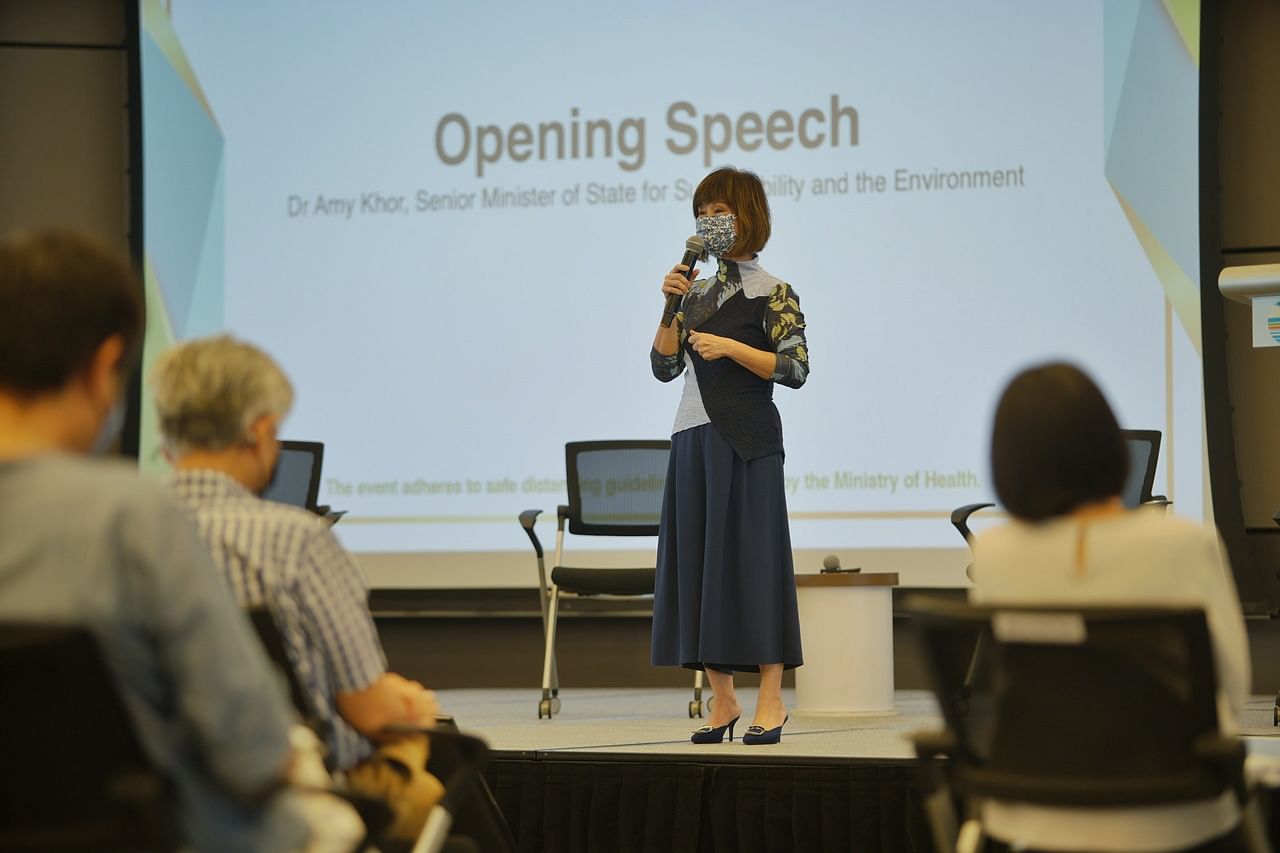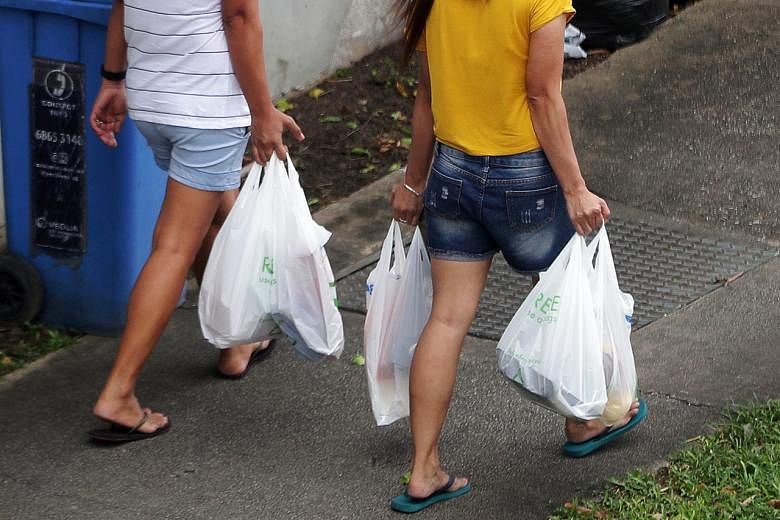SINGAPORE - A charging model for disposable carrier bags at supermarkets to cut the consumption of disposables is being worked on, said Senior Minister of State for Sustainability and the Environment Amy Khor on Saturday (April 10).
She was delivering her opening address at a presentation by the Ministry of Sustainability and the Environment (MSE) and the National Environment Agency (NEA), where they responded to proposals by a citizens' workgroup in reducing the use of disposables.
She said the MSE and NEA will start public consultations to develop the charging model for such bags.
In a speech at the workgroup in January, Dr Khor had explained why the Government had not charged a fee for disposable bags.
The reasons included the need for plastic bags to bag waste responsibly and hygienically, the stringent anti-littering measures here, and the cost impact on low-income households.
On Saturday, Dr Khor said Singapore's steps towards establishing fees for carrier bags in supermarkets will consider any potential impact on low-income households.
She said the Government will consult supermarkets and members of the public on the mode of charging, whether it is per bag or per transaction.
She gave examples of how it may cost five cents or 10 cents per bag.
She said the timeframe needed to implement the charge will be considered, as the industry would need time to adjust to this.
Dr Khor added there might be a need for legislative amendments.
The Government would also have to think about where the proceeds from the disposable bag fees would go to, such as towards environmental causes.
Details of the carrier bag charge will be finalised after the public consultations.
Among 14 proposals by the workgroup, which were presented to the Government in January, MSE and NEA will support and help develop eight of them.
The charging model for disposable bags in supermarkets is one of them.
Dr Khor stressed that charging for carrier bags is not a silver bullet in tackling the excessive use of disposables.
She said: "Even if it's a token mandatory charge of disposable carrier bags at the supermarket, it will serve as a very useful, important reminder to the shopper to take and use the bags mindfully."
She said one of the reasons for the Government's decision to implement a disposable bag charge was because consumers were increasingly becoming receptive towards charging for disposables.

Since 2019, NTUC FairPrice has imposed a plastic bag charge at 25 outlets.
The bags are charged at 20 cents per transaction at its supermarkets, and 10 cents per transaction at its convenience stores like Cheers.
Between 2019 and last year, those outlets saved 15.6 million plastic bags, noted Dr Khor.
About seven in 10 customers who shopped at those outlets chose to have their own bags with them or refused plastic bags.
Retailers such as Uniqlo, Watsons, H&M and The Body Shop are also charging for single-use carrier bags.
In 2019, about 200,000 tonnes of disposables, enough to fill 400 Olympic-size swimming pools, were sent for incineration.
Dr Khor added that a 2018 study by the Singapore Environment Council found that shoppers here take 820 million plastic bags from supermarkets each year, or 146 bags per person.
The excessive consumption of disposables adds to carbon emissions, and the incineration ash takes up valuable space at Semakau Landfill, said the NEA in a statement.
Singapore's only landfill is projected to run out of space by 2035 if no action is taken.
Supporting the citizens' workgroup recommendation to enhance sustainability education on e-learning platforms, MSE and NEA will work with the Education Ministry to enhance the teaching of environmental sustainability in schools through the Eco-Stewardship Programme, and adapt the content into a one-stop website for the public.
On the suggestion for apps or gamification methods that can provide incentives for people to track and reduce their usage of disposables, NEA and MSE encouraged people to explore this and incorporate this in existing apps and platforms.
People and organisations keen to work with the Government to jointly develop some of the recommendations can register their interest at this website by May 31.
How it's done elsewhere
Dozens of countries have fully or partially banned the use of plastic bags. Here is a look at some of their measures.
China
The first day of this year marked the beginning of Beijing's ban on single-use plastics, including bags and straws.
Non-degradable bags will be banned in all the country's cities and towns next year, though markets selling fresh produce will be exempt until 2025.
Thailand
Major stores have been prohibited from carrying single-use plastic bags since last year, as part of a campaign launched by the government and retailers towards a complete ban this year.
Indonesia
The country plans to levy an excise tax of 200 rupiah (two Singapore cents) per plastic bag to halve the use.
The capital Jakarta began its ban on single-use plastic bags at shopping centres, convenience stores and traditional markets in July last year, after similar measures were adopted by other cities and regions.
Japan
A mandatory fee of three yen (four Singapore cents) to five yen for each plastic bag was introduced in stores after the government's order last July banning the practice of dispensing complimentary bags.
UK
The United Kingdom began imposing a five pence (nine Singapore cents) charge per plastic bag in 2011 in Wales, and this was later rolled out to England, Scotland and Northern Ireland.
The charge applies to all retailers employing more than 250 people. It is set to rise to 10 pence in England this year.
Malaysia
The nation began its campaign towards zero disposable plastics in 2018, which includes charging 20 sen (6.5 Singapore cents) per plastic bag at retail premises.
This fee will be extended to wet and night markets from next year.
Kenya
The country outlawed plastic bags in 2017 and has one of the world's strictest regulations governing their use.
It is illegal to manufacture, import or sell them, and offenders can be fined up to US$40,000 (S$53,700) or jailed for up to four years.
Those who use plastic bags can be fined up to US$500 or jailed for up to a year.


